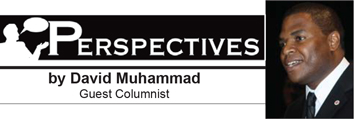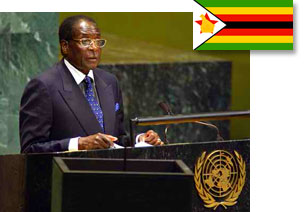Why Robert Mugabe Is Hated
By David Muhammad Guest Columnist | Last updated: Nov 28, 2017 - 10:31:47 PMWhat's your opinion on this article?

|
White supremacy came to Zimbabwe through Cecil Rhodes and the territory subsequently was named Rhodesia after him in 1895.

|
It is said that when Europeans move in to invade territory, even when they lose the war, they win the peace.
In his last will and testament, Rhodes said of the British, “I contend that we are the first race in the world, and that the more of the world we inhabit the better it is for the human race. I contend that every acre added to our territory means the birth of more of the English (White) race who otherwise would not be brought into existence.”
Rhodes wanted to make the British Empire a superpower in which all of the British-dominated countries in the empire, including Canada, Australia, New Zealand, and Cape Colony, would be a part of the British Parliament. He also included White American students as eligible for his scholarships. He used the term “elite philosopher kings” as those whom he wanted to create to dominate Africa. He was also hopeful that the United States would rejoin the British Empire to create permanent worldwide White power hegemony. In addition he felt that Germany would unite with the United Kingdom, and the U.S. to dominate the world and ensure their version of “perpetual peace.”
Rhodes has been labeled an “architect of apartheid” and the ultimate “White supremacist.”
Rhodes advocated the governance of indigenous Africans by Whites and he was quoted as saying, “if the Whites maintain their position as the supreme race, the day may come when we shall be thankful that we have the natives with us in their proper position.”

Robert Mugabe
|
Robert Mugabe was born February 21, 1921 into an already oppressed zone and people.
Just three years earlier in 1918, the Judicial Committee of the Privy Council in London issued a ruling that the land of Southern Rhodesia was owned by the Crown and not by the British South Africa Company, a ruling which led on to increased pressure within the colony for self-government. After self-government was granted in 1923, the Southern Rhodesia House of Assembly decided to make a legal framework for the allocation of land.
The Land Apportionment Act 1930 divided land in the colony between areas where only Europeans could own property, areas which were held “in trust” for African tribes on a collective basis, and areas where only Africans could own property.
African families were ejected from land they had worked for generations.
Zimbabwean Whites, although making up less than one percent of the population, owned more than 70 percent of arable land, comprised of the best, more fertile portions.
Ian Smith’s party, the Rhodesian Front, won all the general elections from 1965 until the end of White rule in 1979. Smith’s government was confronted by Black nationalists in the 1971-1979 Rhodesian Bush War.
After 14 years of maintaining White rule in the face of war, economic sanctions and international pressure, he negotiated an Internal Settlement in 1979.
Majority rule was achieved in 1980 after the Lancaster House Agreement on December 21, 1979, and the election of Robert Mugabe as prime minister of the newly-renamed nation of Zimbabwe.
The British Government invited President Mugabe and others to participate in a Constitutional Conference whereby under the new Independence Constitution, 20 percent of seats in the country’s Parliament were reserved for Whites.
Both British and American governments of the day offered to buy land from willing White settlers, under a “Willing buyer, Willing seller” principle, and a fund was established to operate for 10 years from 1980 to 1990.
Smith remained a member of the Zimbabwe Parliament until 1987.
Subsequently, he enjoyed a long and comfortable retirement in his native Zimbabwe before relocating to Cape Town, South Africa.
The political system of Rhodesia made its Whites one of the wealthiest communities in the world.
Although never significantly more than five percent of the total population, Whites dominated the country and used this domination to their advantage. Fifty percent of the land was reserved for White ownership, through the Land Apportionment Act, and most senior positions in the public service were reserved for Whites.
The provision of health care, education and social services were all heavily weighted towards Whites. For example, education was provided along racially segregated lines, and 11 times more was spent per head on White pupils than was spent on Blacks. This was the system that Smith would become committed to maintain and defend.
But when time came for justice, President Mugabe sought to give back lands stolen from the original Black farmers. Mugabe was unhappy that while “justice” was established in theory on paper through legislation, there were still systems in place to ensure that Whites remained wealthy, in control of the economy and real estate, and Blacks were destined to remain poor and disenfranchised.
A Mugabe land reform program targeted vast land holdings of more than 30 million acres, more than the size of Belgium, that were in the hands of just 4,000 White farmers. The land was marked for redistribution to millions of landless Blacks in Zimbabwe. Western powers derided the idea as Mugabe cronyism and started to punish and economically punish Zimbabwe. But veterans in the independence war had demanded land and marched onto huge farms owned by Whites. The U.S. and the United Kingdom had reneged on paying White settlers for their land so President Mugabe expropriated it.
His actions were designed to correct historical injustices African people had suffered. But the biggest fear on the part of the Whites was that other African nations might be inspired to return stolen land and resources to Africans. And it is for this reason that Robert Mugabe has been demonized, ridiculed, mocked, scorned and negatively portrayed in the Western media. In 2002, Minister Louis Farrakhan told President Mugabe, “You might want to give in, but you should not give in for the sake of your children and your grandchildren. You must stay the course.”
It is likely that there was a malicious Western hidden hand behind President Mugabe’s recent ousting but regardless of what happens, he will be remembered by conscious people all over the world for the courageous stance that he took against the powerful, global, imperialist forces of exploitation and theft of Africa’s riches.
David Muhammad is the Trinidad and Eastern Caribbean Representative of the Honorable Minister Louis Farrakhan. Read more from him at www.blackagendaproject.com.
INSIDE STORIES AND REVIEWS
-
-
About Harriett ... and the Negro Hollywood Road Show
By Rabiah Muhammad, Guest Columnist » Full Story -
Skepticism greets Jay-Z, NFL talk of inspiring change
By Bryan 18X Crawford and Richard B. Muhammad The Final Call Newspaper @TheFinalCall » Full Story -
The painful problem of Black girls and suicide
By Charlene Muhammad -National Correspondent- » Full Story -
Exploitation of Innocence - Report: Perceptions, policies hurting Black girls
By Charlene Muhammad -National Correspondent- » Full Story -
Big Ballin: Big ideas fuel a father’s Big Baller Brand and brash business sense
By Bryan Crawford -Contributing Writer- » Full Story






 Click Here Stay Connected!
Click Here Stay Connected!








